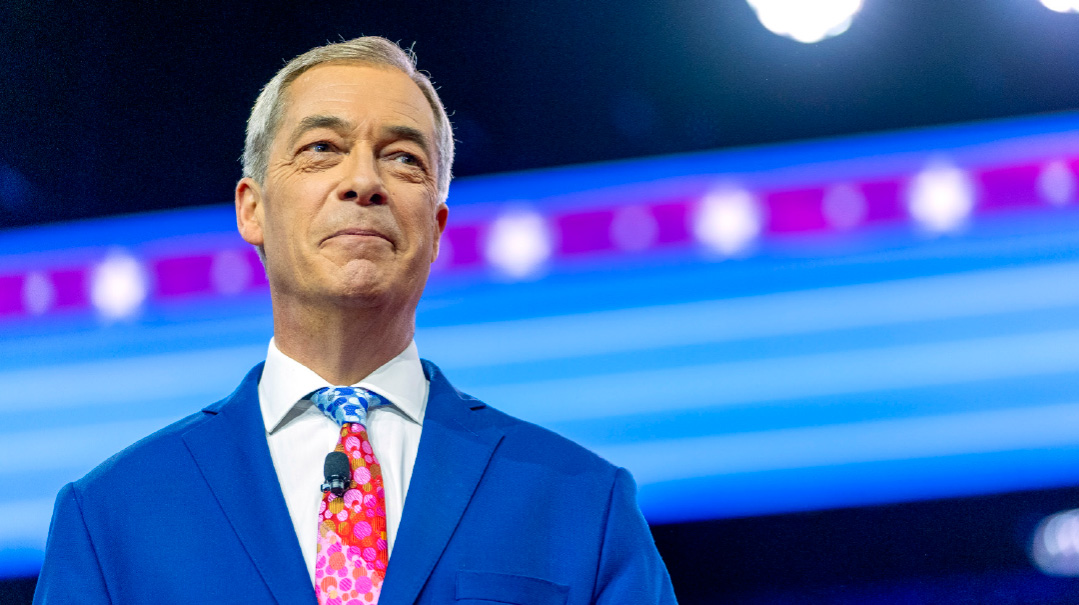A Nightmare Named Nigel
| June 9, 2024Nigel Farage is taking the fight directly to the Tories

Photos: AP Images
IT
was the announcement the Conservatives dreaded, and it came on the very day that two comprehensive constituency-level polls predicted a catastrophic result for them at the upcoming election. Nigel Farage, charismatic Brexiteer and scourge of the metropolitan classes, is taking over the leadership of Reform UK and standing as an MP — and he’s taking the fight directly to the Tories.
You could almost hear the champagne corks popping in Labour HQ over this exact reversal of positions from 2019. At the last election, Farage’s Brexit Party made a deal with the Tories, and the right-wing vote consolidated behind Boris Johnson, helping him secure a large majority. Now, Farage’s leadership of Reform UK, the Brexit Party’s successor, and his election as an MP, will eat into the Conservatives’ already-diminished vote share. According to YouGov, 25% of 2019 Conservative voters are considering voting Reform. This will most likely gift Labour with an even larger majority than the 100-plus seat landslide they’re predicted to win.
Farage emerged as a force in UK politics in the early 2010s as leader of the UK Independence Party on an anti-immigration, anti-EU ticket. UKIP first shocked the establishment by coming out on top in the 2014 European Parliament elections. In local elections held that same day, they got the third-highest vote share and went from three to 166 councillors. Two Conservative MPs defected to UKIP and held their seats in subsequent by-elections, though one went back to Conservative at the 2015 election. Spooked by Farage’s ability to attract the Tory right, David Cameron committed to holding a referendum on EU membership if he got elected in 2015. In that election, UKIP’s vote share quadrupled to become the third highest across the UK.
Since 2021, Farage has been honorary president of Reform UK, the Brexit Party’s successor, and he’s been hammering the Conservatives on their immigration record. Legal migration has tripled since they took office in 2010, and there have been over 100,000 small boat crossings — illegal crossings via the Channel — since Brexit in late 2020.
According to political academic Matt Goodwin, who predicted that Farage would run, even after the man himself ruled it out at the beginning of the campaign, Farage is looking to capitalize on the wave of apathy from millions who don’t feel represented by either the Tories or Labour. They’re angry about mass immigration, and they’re worried about the growing sectarianism, social disintegration, and Islamic extremism that have emerged since October 7, problems that mainstream parties are reluctant to talk about or address.
Post-Brexit, the government can no longer blame the EU for its problems. Farage — and voters — blame the Conservatives for presiding over these intensifying problems and failing to tackle them. Goodwin explains that Farage sees the Tories as indistinguishable from Labour, so they must be ousted and forced to accommodate the views of Farage and his ilk.
Farage made his big announcement behind a lectern saying “Rishi can’t stop the boats,” a jibe at Prime Minister Sunak’s heavily touted promise to “stop the boats.” Farage is running in Clacton, which elected a UKIP MP in 2015 and voted 70% in favor of Brexit in the referendum. Polling suggests he will be victorious there.
Already-disheartened Conservatives have descended further into panic mode. The morning after Farage’s announcement, the government committed to a cap on work and family visas, with the numbers lowered for five successive years, a move that smacks of desperation.
A parliamentary seat would gift Farage both a platform and mandate for his views, and will further tear the already fractious Tory party apart as they lick their wounds and fight over the future of British conservatism.
Seal, Biden, Seal
For months, Republicans have stymied President Biden’s efforts to pass border security legislation, preferring to keep it as a burning issue on which Trump could capitalize. Biden could have passed an executive order to shut the southern border if crossings surged, but he’s resisted doing so, fearing backlash from the progressive wing of his party.
Now, after Republicans defeated a border security bill tied to aid for Ukraine, it appears this executive order is imminent. Cue moral outrage from his left flank for conceding the debate to conservatives (the horror!), but Biden is worried enough about his weakness on this issue costing him the election to go for this option. It could be legally challenged, and there could be a surge of attempts in more remote parts of the crossing, but administration officials hope that this will alleviate some of the political pressure facing Biden come November.
Meta’s Mea Culpa
The odds are usually stacked against conservatives fighting social media leviathans, but a Belgian judge has ordered Meta to pay more than €27,000 to right-wing Belgian MEP Tom Vandendriessche. The tech giant had deployed a shadowban, which organically lowers a user’s reach on its platforms, claiming the MEP had posted content that violated Facebook’s hate speech rules. The judge ruled that Meta had not acted in good faith regarding its agreements, nor had it been transparent with users about its censorship procedures. Which is legalese for double standards on hate speech that Meta and others are notorious for: slow to call out incitement on the left, but quick to pounce on infractions from the right.
School Shakeup in Sunshine State
Florida governor Ron DeSantis’s school choice program has been wildly successful. Maybe a bit too successful, because while charter schools (schools that are free from many state regulations and that earn state support through performance standards), private schools, and homeschooling have attracted tens of thousands of children, traditional public schools are struggling to fill their classrooms.
Since Covid, 53,000 students have left public schools across Florida, leading officials in one county to float proposals to close up to 42 campuses over the next few years. Local communities have expressed concern at the potential closure of public schools in their area, but DeSantis is doubling down, expressing hope that his model will serve as a blueprint for other states.
Charter schools lobbyist Chris Moya is similarly unsympathetic: “If your product is better, you’ll be fine. The problem is, they [public schools] are a relic of the past — a monopolized system where you have one option. And when parents have other options, they vote with their feet.”
Strikingly, enrollment in the state’s top-ranked school district is up, proving exactly that.
(Originally featured in Mishpacha, Issue 1015)
Oops! We could not locate your form.







